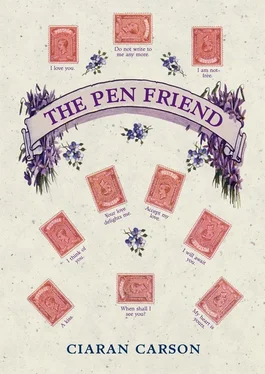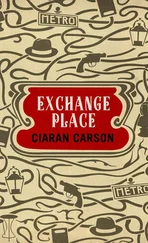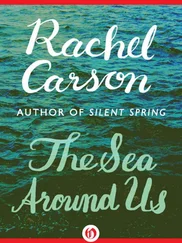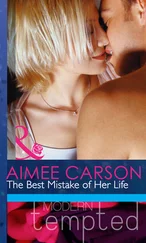You’d imagined yourself there in Lee Miller’s shoes, you’d memorised whole sentences of her Vogue piece, as if you had stepped back in time up the dark staircase into Colette’s third-storey apartment in the Palais Royal gardens. Colette’s sitting up in a bed covered with tawny furs, her frizzy hair like a halo against the cold light from the tall windows, you said. She talks about the black market, the end of the war, the erratic electricity supply, and then she enters her past, darting here and there to choose an object, or a book, but never leaving the bed, for I’m an extension of her body, her hand guiding my arm to reach an envelope of pictures from a high shelf, none of them in order, and they slither out all over the bed and off the bed as she skims through them, each summoning up an anecdote, which in turn attracts another object, a souvenir, a keepsake, a letter from Proust or a portrait of her by Man Ray, towards the bed. She’s what, seventy-one, seventy-two, and her many lives run through my mind’s eye like sepia flashbacks, you said, Colette the siren, the gamine, the lady of fashion, the diplomat’s wife, the mother, Grand Officer of the Légion d’Honneur, Colette the author of the Claudine books which inspired a stage play and a whole range of products, Claudine cigars, Claudine uniform, Claudine soap and perfume, though Colette’s own cosmetics shop went bust, and there’s a many-layered aura in the tall-windowed room that’s lined with bookshelves and alcoves, there’s butterflies in picture-frames, and glass-domed jars with votive offerings in them, little floating hands and ships and acrobats, sealed in holy water. There’s glass paperweights with flamboyant marble swirls in them, and snowstorms, and crystal balls.
Then she shows me the manuscripts, you said, the early ones neatly written in school exercise books, pink and blue printed covers labelled in purple ink. The later ones are a labyrinth of scrawls and crossings-out and arrows, from which she makes fair copies with big spaces between the lines, which in turn fill up with more alternatives and second or third thoughts, you said, more cancellations, and so the whole process of spinning the yarn begins again. Until I read Lee Miller on Colette I had no idea that Colette, the natural writer, as I’d thought of her, the mistress of the spontaneous phrase, worked in so laborious a manner. She shows me her pens, seven of them standing in a big blue jug. There’s ones with broad soft nibs for first drafts, and ones with fine hard points for writing between the lines, and a special one bought by a special someone for her in the Twenties, that she uses when she’s stuck. She keeps trying the switch by her bedside but the electricity’s been off all day, and when I leave it’s almost dark. I remember the last glimmers of light imprisoned in the crystals, and the iridescent blue of the framed butterflies, and the whites of Colette’s eyes, you said, as if repeating a long-rehearsed quotation.
I take it you spoke French to her, I said. Well, Lee Miller did, her French was nearly perfect, you said. As is yours, I said, and you gave a self-deprecating shrug, but it was true, your French was much better than mine. I could read French with only occasional recourse to a dictionary, and I had felt a glow of self-congratulation when I discovered I could follow most of the Easter Sunday sermon in Saint-Eustache, but then the priest’s enunciation had been exquisite, and I knew the theme — of darkness, light and resurrection — well enough from similar childhood sermons. It was familiar territory, and I knew the signposts. And I thought I could speak French reasonably well, but when I did, my collocutor, assuming I knew French well, would unleash a torrent of words in which my comprehension would immediately flounder. But you, Nina, were never out of your depth: French was a second element to you. Your whole body language would change as you spoke, adopting a vocabulary of Gallic shrugs, pouts, frowns and gesticulations, as if you were clothed by French, and became someone other than the one I thought I knew. I loved and admired you for it, and wondered sometimes if I envied you, if envy ever entered into love, for both are emotions, whereas admiration is dispassionate. And, half-jokingly, I’d propose that the whole world should indeed have learned Esperanto, for then we would not need to learn the languages of different nations in order to communicate with them. But that’s precisely the point, you’d say, the point is the difference. Vive la différence , as they say. When I speak French, when I listen to French, I think differently, and I say things other than what I’d say, were I speaking English, you said. And of course I knew this myself, for Irish, after all, was my first language, and I not only thought differently in it, but felt differently. Or at least I did once, for now my Irish is like a ghost of itself behind my more accustomed English. As it was then.
We’d gone to Montmartre one day. From the steps of Sacré-Coeur, we gazed down at Paris, radiantly clear in the meticulous April light. I always think that Paris is like the French language, you said, the way it’s departmentalised, as you pointed out the various districts, Saint-Germain-des-Prés, the Tuileries, the Latin Quarter, Montparnasse, the Invalides, the Marais. Of course the boundaries, the definitions, have been eroded over the years, but then so has the language, if you’re to believe the academicians. But the old fabric is still there under all the changes. Look, over there, and you pointed to a green space in the distance, that’s the Jardin des Plantes, rue Mouffetard’s not far off, you can’t see it, but we’ll have to go there, they have a brilliant market, it’s been on the go for centuries. It’s this steep narrow street, it’s packed with shoppers, stalls along the pavements, open shop fronts with their awnings out, butchers, trays of calves’ liver and tripe and the lovely pot roasts they do, all parcelled up with butcher’s string, it’s a work of art, and those yellow chickens with the heads and feet still on them, then there’s the greengrocers, big fat knobbly tomatoes, all kinds of fresh salad stuff, and the fishmongers, marble slabs awash with cod and halibut and sea-bream and ray and conger eel and lobsters and sea urchins, and God knows what other kinds of creatures, I know what they are in French, but I couldn’t tell you the English for them. And the cheese counters are really unspeakable, I don’t know how many hundreds of kinds they have, and you have all these smells wafting around, between the cheese and the fish and the fruit and vegetables and flowers, the smell of anchovies and olives and Gitanes. Then you come to the end of the street, you turn a corner, go down an alleyway, and you’re in an empty Roman amphitheatre, it’s been there since Paris was, if not before.
That’s what I love about Paris, you never know what’s round the next corner, you said; and from my small experience of the city, it seemed true. I remember especially the evening we dined early in one of the streets off rue Montorgueil. Chez Bibi, that was the place, we were the first customers, and Madame Bibi herself, as we supposed her to be, engaged us, or rather you, in a long colloquy regarding the merits of the food we were about to eat. And the food was good, if a little heavy, solid Bordelaise cooking with wine-reduced sauces, and the wine was good too. By the time we stumbled out, satisfied and half-dazed, rue Montorgueil was thronged with people out for the night, the restaurants and cafés overflowing on to the pavements, and the cool evening air was resonant with conversation and clinking glasses.
We walked north, we crossed a boulevard; suddenly, as if a curtain had descended, the buzz of rue Montorgueil died behind us and we entered a silent zone, a maze of grey deserted streets and alleyways, which turned out to be the garment district. You remember, Nina, how entranced we were by the window displays, the cards of loom elastic, buttons, needles, pins and hair-clips, reels of cotton thread displayed like colour charts, long fat bolts of pink and blue and green cloth, the dresses that seemed thirty years out of date, the tailor’s dummies posed in attitudes of faint surprise? I never knew this place existed, you said, and I was somehow pleased that we were both foreigners now, explorers of a strange new world.
Читать дальше












